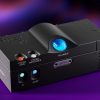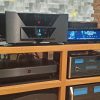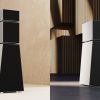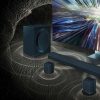When evaluating UST (Ultra Short Throw) projectors, the video performance is what really matters. If a UST projector sounds great but looks terrible, that’s hard to fix. But if a UST projector looks great but sounds terrible, you can always remedy that with a proper surround sound system or even a good soundbar. But for those who actually might care about the built-in sound of this year’s crop of UST projectors, we’ve got you covered.
On the day after this year’s Laser TV Showdown, I joined event organizer and emcee Rob Sabin from ProjectorCentral at the ProjectorScreen.com showroom to take a listen to this year’s competitors. Many customers will set these UST projectors up in a living room or basement and expect decent quality sound to accompany that big beautiful image. And while we always recommend investing in a real surround sound system (or at least a high quality soundbar), there are those who will use the built-in speakers, at least temporarily, and we’d like these prospective customers to know what they’re in for as far as the sound quality goes.

With projectors in the competition ranging in price from $1,899 to $8,999, the audio portion of the competition flew in the face of the old expression, “you get what you pay for.” The least expensive model in the competition was near the top for sound quality, while the most expensive projector in the competition scored closer to the bottom of the results. Here’s what we heard in NJ last week.
Note: also check out our coverage of the main event: Best UST Projectors Compete at 2023 Laser TV Showdown: Here are the Winners
The Competition
The same projectors evaluated for video performance on the first day of the event were fed a number of high quality movie and TV show clips and music tracks to evaluate the audio performance on day two. To maintain fairness, Rob and I (OK, mostly Rob) identified an area of the screening room with minimal echo and reverberance and we (OK, mostly I) moved each projector into the same space in the room, one at a time, for the audio evaluation.
Competitive Models in this Year’s UST “Laser TV” Showdown:
- BenQ V5000i 4K Triple Laser 2500 Lumen UST Projector ($3499)
- Epson LS800 ProUHD Single Laser 3-Chip LCD 4000 Lumen UST Projector ($3499)
- ForMovie Theater 4K Triple Laser 2800 Lumen UST Projector ($3499)
- Formovie C3 4K Single Laser 2250 Lumen UST Projector ($1899)
- Hisense PL1 4K Single Laser 2100 Lumen UST Projector ($2499)
- Hisense PX2-Pro 4K Triple Laser 2400 Lumen UST Projector ($2999)
- Leica Cine 1 4K Triple Laser 3000 Lumen UST Projector ($8995) – B&H Photo
- Nexigo Aurora Pro 4K Triple Laser 2400 Lumen UST Projector ($2999)
- Ultimea Thor T60 4K Triple Laser 4000 Lumen UST Projector ($4999)
We used a collection of lossless stereo music tracks and Dolby Atmos immersive music tracks from TIDAL, along with Dolby Atmos clips from “Dune” (on UltraHD Blu-ray) and “Andor” (streamed from Disney+) for the evaluation. Rob and I independently recorded our impressions of various elements of sonic performance including bass extension (or lack thereof), stereo (music) imaging, Movie imaging and immersiveness, overall volume and dynamic range and sonic accuracy/timbre. We then compared notes and discussed how we came to these decisions.
After results were compiled, we categorized the sonic performance of each projector into three groups or tiers. Here are the raw composite scores from our listening session:

Sound Performance of UST Projectors By Tier
Tier One: these projectors provided sound that was eminently listenable. While they could not reproduce the full spatiality of immersive soundtracks like Dolby Atmos, they could present a reasonably spatious soundstage that enhanced our enjoyment of movies and TV shows. Even the best of these (The ForMovie Theater) struggled to reproduce any real low bass, but the bass these projectors could reproduce was solid and well integrated with the mid and upper frequencies.
Tier One UST Projectors (Sound Quality Only):
- ForMovie Theater
- ForMovie Cinema 3 (C3)
Tier Two: these projectors provided sound quality that would get you buy in a pinch, while you’re saving up for a nice surround sound system or a high quality soundbar. Bass was thin but there were no annoying gaps in frequency and there was some sense of imaging and spatiality. Singer vocals and dialog were clearly reproduced so you could easily follow along with movies and TV shows. You could even enjoy music on these systems if you’re expectations are not too high.
Tier Two UST Projectors (Sound Quality Only):
- Epson LS800
- Nexigo Aurora Pro
- Ultimea Thor T60
- BenQ V5000i
Tier Three: these systems had flaws in audio reproduction that were so egregious as to make us question the wisdom of even including speakers on these devices at all. In my grandmother’s words, “sometimes it is better to remain silent.” Bass was missing entirely. Dynamics were extremely limited. Dialog was inarticulate and imaging was just a mess. If you buy one of these projectors, do yourself a favor and just buy a soundbar or surround system to go with it. Immediately.
Tier Three UST Projectors (Sound Quality Only)
- Hisense PL1
- Hisense PX2-Pro
- Leica Cine 1
Missed Opportunity
As Rob explained last year, these projector makers could add one very simple thing to these projectors that would take their audio performance to the next level: a subwoofer output (or a variable headphone output that could be hooked up to a powered subwoofer). The main area where many of these systems struggled was in mid to low bass performance. Even though many of the UST projector cabinets are large (and heavy!) enough to reproduce decent bass, it’s likely that these projector makers roll off the low bass response to prevent sensitive optics within the projector from being disturbed by the low bass rumble and vibrations.
If there were a subwoofer output, a simple inexpensive powered subwoofer could be added and would take the performance of the built-in speakers up a notch or two. Powered subs are also fairly flexible in placement so the owner wouldn’t have to worry about how and where to place a soundbar or speaker system without intefering with the clean look and design of their fancy new UST projector.
Sadly not a single one of this year’s competitive UST projectors offered a subwoofer output or a volume-controlled headphone/line output that could be used to drive a subwoofer. The closest any of them came were the HiSense projectors (PL1 and PX2-Pro) and the LEICA Cine 1, which is based on a Hisense projector but with Leica optics. On these projectors there was a headphone output which we could plug into a powered subwoofer, and there was even the option in the menu to have both the headphone output and the main speakers active at the same time. But when both were active the volume control not longer operated the volume of the headphone output, which meant the subwoofer stayed at one volume, no matter what level the main speakers were set to.
We did some testing of what could have been possible by manually adjusting our powered subwoofer volume to match the level of the built-in speaker, and the results were promising. But this is way too awkward to do in the real world, unless you want to get up and manually adjust your sub volume every time you adjust the main volume. Oh, Hisense, you almost had it right!
Listening Highlights: The Good, The Bad and the Ugly
While the ForMovie Theater repeated its win from last year for best overall sound quality, it wasn’t the only projector that stood out in the competition. Rob and I kicked off the listening session with the most expensive projector in the bunch, the Leica Cine 1. Sadly, this unit, which performed well in the video portion of the Showdown, produced a flat, abrasive overall sound with both movies and music material. It literally made me cringe. Limited dynamic range, no bass extension, no coherence. It could play fairly loud, but not in a good way. Buy the Leica for its detail and optics quality, pair it with a good surround system and just turn off the built-in speakers.

We followed the Leica up with the ForMovie Theater and I could immediately see (well, hear) why this unit performed well in last year’s competition. The unit, featuring sound designed by Bowers & Wilkins, offered an open airy soundstage on Dolby Atmos movies and TV clips and Dolby Atmos music tracks. Bass was solid, though not very extended. Vocals and dialog came through crisply and cleanly. Height effects like rain falling from above in the opening of “Andor” season 1 episode 1 were distinct and did seem to come from a bit higher than the rest of the sound, but not above your head as you’d hear on a true Dolby Atmos system with dedicated height speakers. Stereo music tracks were eminently listenable with a well defined, if not super-wide, soundstage. The speaker system in the ForMovie is at least as good as a solid mid-tier dedicated soundbar.

Another standout for me was the smaller ForMovie Cinema 3 (C3). Rob started playing this one while I was out of the room and even from 30 feet away, off axis, as I reentered the room, this little guy made a positive impression. It wasn’t quite up to the performance of its big brother, and it couldn’t decode Dolby Atmos tracks directly, but it reproduced a punchy and tuneful overall sound for both movies and stereo music. Dynamics were excellent for its size with some slight compression of overall dynamic range. It had nice layering of instruments and voices in music. It got louder than I expected without excessive strain and produced clear dialog in video clips even when the effects and score got complicated. Considering it’s the least expensive projector in the competition, I was surprised at how good it sounded.

In the middle tier (Tier Two), the Epson LS800 stood out to me for tonal accuracy and realistic timbre. The unit’s sound system was designed in partnership with Yamaha and it shows in the overall sound quality. The LS800 also performed well on video clips with coherent imaging and solid dialog reproduction. Its overall dynamic range was fairly extended, not far behind the dynamics of the ForMovie projectors. We prefered the “Theater” mode for movies and TV shows, while “Studio” mode was the most natural-sounding for music reproduction.
The Nexigo Aurora Pro offered solid dialog articulation, but it broke up a bit on complex, dynamic music and movie passages. On softer music tracks like “Prodigal Daughter” by Aoife O’Donovan and Allison Russell, the Nexigo reproduced the softly strummed guitar and female vocals nicely with fine details revealed and an airiness around the instruments that was lacking in some of the lower performing projectors. The BenQ V5000i also put in a strong audio performance with tibral accuracy that was nearly on par with the ForMovie Theater and strong imaging on both music tracks and video clips. But the BenQ’s overall dynamics were not as strong the Tier one performers or the Epson and the max volume was a bit lower than we would have liked. The Ultimea Thor T60 was a step below the BenQ in overall sound quality and was also limited in its dynamics and max volume, particularly on Dolby Atmos music tracks. But it did offer solid dialog and good reproduction of two channel music tracks.
The two Hisense projectors produced sound that was similar to the Leica, which is unsurprising, since the Leica has “Hisense guts” but the Hisense projectors were actually a bit better at reproducing dialog in complex passages and at producing a spacious ambient effect on video clips. Overall dynamics were not great on either Hisense projector and the volume control itself did almost nothing from 40 up to 100 on the scale. As with the Leica, I’d strongly recommend pairing the Hisense projectors with a good soundbar or surround sound system from day one.
The Bottom Line
As with many televisions today, sound quality on some UST projectors is clearly an afterthought. While a few models like the Formovie Theater, Epson LS800 and Formovie C3 can produce enjoyable sound right out of the box, most UST buyers would be best served by investing in a high quality soundbar or component-based surround sound system. After all, what good is a big picture without big sound to go with it?
Top Three Best-Sounding UST Projectors of 2023:
- ForMovie Theater 4K Triple Laser 2800 Lumen UST Projector ($3499)
- Formovie C3 4K Single Laser 2250 Lumen UST Projector ($1899)
- Epson LS800 ProUHD Single Laser 3-Chip LCD 4000 Lumen UST Projector ($3499)
Related Reading: Top UST Projectors Compete at 2023 Laser TV Showdown. Here’s Who Won







































